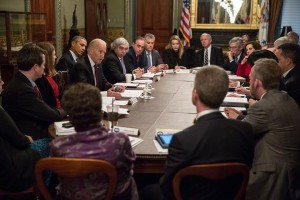White House Announces National Cancer Moonshot Task Force

Photo Credit: The White House
On February 1, the White House announced a new $1 billion initiative to jumpstart the new national “moonshot” initiative announced by President Obama in his 2016 State of the Union Address. The President established the White House Cancer Moonshot Task Force via a presidential memorandum, which will be led by Vice President Biden. The goal of the initiative is “to eliminate cancer as we know it.” The Task Force’s membership will include the leadership of the Departments of Defense (DOD), Commerce (DOC), Health and Human Services (HHS), Energy (DOE), Veterans Affairs (VA), and the Office of Management and Budget, National Economic Council, Domestic Policy Council, Office of Science and Technology Policy, Food and Drug Administration (FDA), National Cancer Institute (NCI), National Institutes of Health (NIH), and the National Science Foundation, among others as designated. NIH is directed to provide “funding and administrative support” for the Task Force. Additionally, the presidentially-appointed National Cancer Advisory Board (NCAB) is directed to also serve on the Task Force and is “strongly encouraged to establish a working group consisting of a Blue Ribbon Panel of scientific experts.” The Task Force is charged with producing a detailed set of findings and recommendations and delivering a report to the President before December 31, 2016.
The $1 billion initiative will provide research funding to “accelerate the development of new cancer detection and treatments.” It includes $965 million in funding for new cancer activities at the National Institutes of Health (NIH) in fiscal year (FY) 2016. For FY 2017, the President’s budget request will include $755 million in mandatory funds for activities at NIH and FDA. In addition, DOD and VA are directed to increase their investments in cancer research through the funding of “Centers of Excellence focused on specific cancers, and conducting large longitudinal studies to help determine risk factors and enhance treatment.” The initiative’s HHS-supported research areas also include prevention and cancer vaccine development, early cancer detection, cancer immunotherapy and combination therapy, genomic analysis of tumor and surrounding cells, enhanced data sharing, and pediatric cancer. FDA will support an oncology Center of Excellence to “leverage the combined skills of regulatory scientists and reviewers with expertise in drugs, biologics, and devices.”

